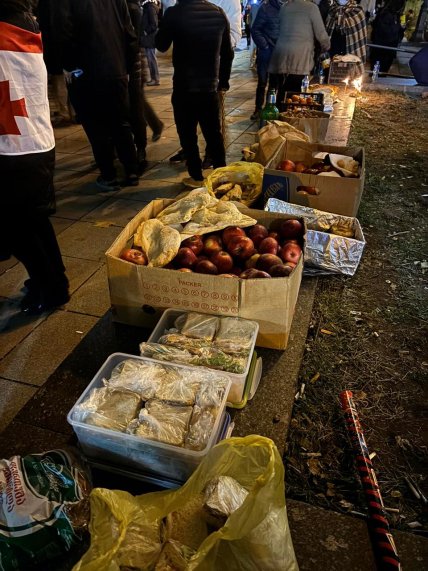Protests in Georgia continue despite beatings and arrests: here's what's happening now (with photos and videos).
In Georgia, protests against the suspension of Euro-integration are ongoing at least until the end of 2028, as announced by Prime Minister Irakli Kobakhidze on November 28. On the evening of December 2, law enforcement carried out another violent crackdown on the protesters, but people remain on the streets.
According to Echo of the Caucasus, on Monday, law enforcement began dispersing the protests as early as the evening, while in previous days this typically started at night or closer to dawn. The director of the patrol police department, Vazha Siradze, stated that participants in the rally allegedly began to behave "destructively" from the very beginning of the demonstration. Therefore, he claimed, it was decided to "use proportional force."

 0
0  1
1  2
2 Special forces tried throughout the night to clear the streets, beating protesters and using tear gas against them. Law enforcement officers grab and arrest anyone who fails to escape, even assaulting women.
The Telegram channel Tbilisi life provides detailed coverage of the protests. They report that one of the detainees shared that law enforcement has no facilities to accommodate those arrested, and she is waiting for her turn.
It is worth noting that protests in Georgia reignited after the government decided on November 28 to abandon negotiations with the European Union regarding membership until the end of 2028 and to forgo EU budget grants. Protesters accuse the government of halting the Euro-integration process and demand new parliamentary elections.
As reported by "Telegraph," the situation in the country escalated at the end of October during the parliamentary elections in Georgia. The struggle was between the ruling party "Georgian Dream," which has governed the country for 12 years, and pro-European opposition political forces.
According to the Central Election Commission of Georgia, the ruling party, also considered pro-Russian, received more than 54% of the votes, allowing it to unilaterally form the government. However, the opposition and the country's president Salome Zourabichvili did not recognize the election results: during the elections, there were reports of mass ballot stuffing, manipulations, pressure, assaults on opposition members, and other egregious violations.